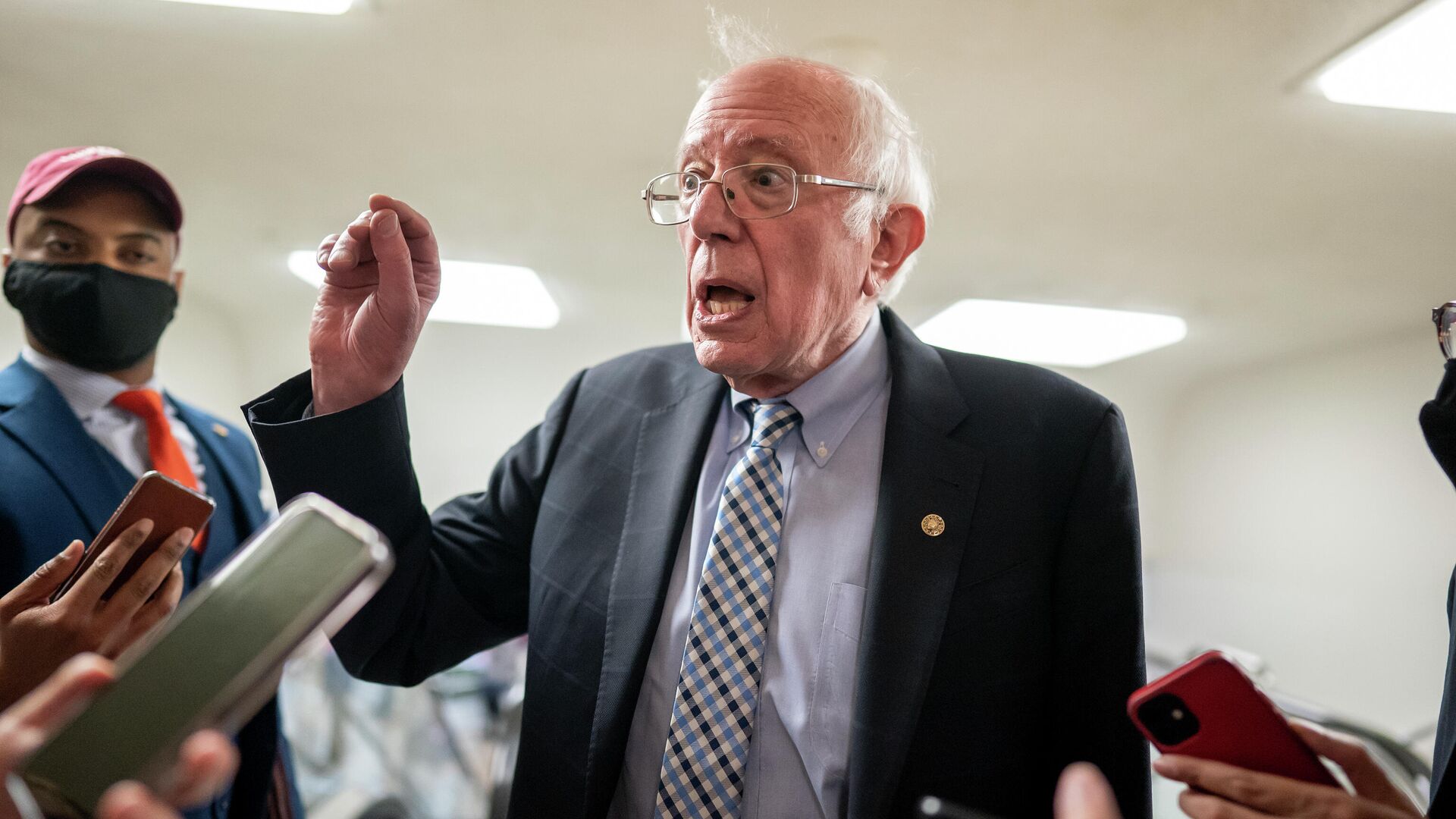Sanders Blocks Resolution That Would Have Forced Rail Workers to Accept Deal

© AP Photo / J. Scott Applewhite
Subscribe
Rail workers are set to strike on Friday if a deal is not reached. A Presidential Emergency Board was commissioned in August to make recommendations to break the impasse. On Monday, Republicans introduced a resolution that would force the union to accept the deal laid out by the board.
On Wednesday, Senator Bernie Sanders prevented the quick passage of a Republican-led resolution that would have forced rail workers back to work before a strike that is set to begin on Friday if unions and rail industry companies cannot come to an agreement before then.
The resolution was proposed by Republican Senators Roger Wicker of Mississippi and Richard Burr of North Carolina. It would require workers, who have been negotiating for better working conditions for three years, to accept the outline laid out by the Presidential Emergency Board (PEB) formed by President Biden in August.
While the workers and rail companies have agreed to compensation levels, the key sticking points that remain are the lack of sick days, paid or unpaid, and a grueling on-call schedule that requires rail workers to be on-call for 12 hours a day for 14 straight days and be ready to get to the job at a moment’s notice. Workers are demanding 15 paid sick days a year and a more reasonable on-call schedule.
The proposal includes a pay increase of 24%, an annual bonus of $1,000 and one additional day of paid leave, but does not include any sick days. If a deal is not reached by Friday, a strike will begin, shutting down freight rails across the country. It has been estimated that the strike could cost $2 billion a year.
Sanders blocked the resolution, arguing that the rail companies are reaping billions in profits while forcing their workers to endure horrible working conditions.
“The rail industry has seen huge profits in recent years and last year alone made a record breaking $20 billion in profit,” Sanders said on the Senate floor. “The CEOs of many of these rail companies are enjoying huge compensation packages. For example, last year the CEO of CSX made over $20 million in total compensation, while the CEOs of Union Pacific and Norfolk Southern made over $14 million each in total compensation. In other words, what is happening in the rail industry is what is happening all over this country. Corporate profits are soaring and CEOs are making incredibly large compensation packages.”
The Vermont senator would later mention that “the rail industry spent over $18 billion, not to improve rail safety, not to address the supply chain crisis in America, but to buy back its own stock and hand out huge dividends to its wealthy stockholders. In fact, since 2010, the rail industry has spent over $183 billion on stock buybacks and dividends.”
Sanders then went on to compare the conditions of rail workers to that of employees at the Department of Transportation.
“If you are an employee at the Department of Transportation in the United States, sitting behind a desk, you are appropriately, I believe this very much, guaranteed 12 weeks of paid family and medical leave. But if you are an engineer, running a train with tons of freight behind you, a very dangerous job, you get zero sick leave. Now, that may make sense to someone, but it does not make sense to me.”
He also noted that providing rail workers with 15 days of sick pay would cost an estimated $688 million a year, which is less than 3.5% of the profit made by the industry.
While the leaders of 10 of the 12 unions have accepted the outline laid out by the PEB, the two largest, which make up roughly half of rail workers in the United States, have not. In addition, the 10 who have accepted it have not put a vote to the rank-and-file members of the union, which is required before it is accepted.
The unions could be forced to accept the deal because of a 1926 law that governs how and when rail workers can strike.
Republican Senator Minority leader Mitch McConnell called out the Democrats for blocking the Burr-Wicker resolution, saying it would have “prevented a crippling strike and supply chain crisis.”
Senate Democrats just blocked our bill that would have given railway workers a big raise and prevented a crippling strike and supply chain crisis.
— Leader McConnell (@LeaderMcConnell) September 14, 2022
If a strike occurs and paralyzes food, fertilizer, and energy shipments nationwide, it will be because Democrats blocked this bill.
However, on the Senate floor, Sanders, who is independent, said it was time for Congress to stand with the American worker.
“It is time for Congress to stand on the side of workers for a change, and not the heads of large multinational corporations. Rail workers have a right to strike for reliable schedules, they have a right to strike for paid sick days, they have a right to strike for safe worker conditions, rail workers have a right to strike for decent benefits. The Burr-Wicker resolution would take these fundamental rights away from workers. We cannot allow that to happen.”
I’m LIVE on the floor of the U.S. Senate to stand with rail workers as they fight for paid sick leave and improved working conditions from rail companies that made $20 billion in profits last year. https://t.co/CyeH2zUl0c
— Bernie Sanders (@SenSanders) September 14, 2022




